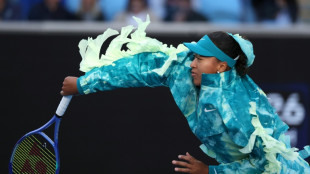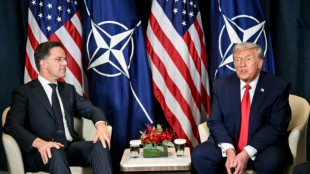
-
 Trump launches 'Board of Peace' at Davos
Trump launches 'Board of Peace' at Davos
-
Stocks rally as Trump drops Greenland tariff threats

-
 Mercedes unveil 2026 F1 car for new 2026 rules
Mercedes unveil 2026 F1 car for new 2026 rules
-
Djokovic, Sinner plough on in Melbourne, Wawrinka makes history

-
 Kitzbuehel's Hahnenkamm, the terrifying Super Bowl of skiing
Kitzbuehel's Hahnenkamm, the terrifying Super Bowl of skiing
-
'Oasis of stability': Madrid becomes luxury housing haven

-
 Swiatek says packed tennis season makes it 'impossible' to switch off
Swiatek says packed tennis season makes it 'impossible' to switch off
-
Sloppy Osaka grinds past 'mad' Cirstea to stay alive at Australian Open

-
 Iran Guards chief says 'finger on trigger', warns US against 'miscalculations'
Iran Guards chief says 'finger on trigger', warns US against 'miscalculations'
-
Imperious Sinner barrels into Australian Open round three

-
 Storms, heavy rain kill 9 children across Afghanistan
Storms, heavy rain kill 9 children across Afghanistan
-
Games giant Ubisoft suffers share price collapse

-
 Exhausted Wawrinka battles on in Melbourne farewell after five-set epic
Exhausted Wawrinka battles on in Melbourne farewell after five-set epic
-
'Too dangerous to go to hospital': a glimpse into Iran's protest crackdown

-
 Bruised European allies wary after Trump's Greenland climbdown
Bruised European allies wary after Trump's Greenland climbdown
-
Austrian ex-agent goes on trial in Russia spying case

-
 Japan suspends restart of world's biggest nuclear plant
Japan suspends restart of world's biggest nuclear plant
-
Djokovic, Swiatek roll into Melbourne third round, Keys defence alive

-
 New Zealand landslips kill at least two, others missing
New Zealand landslips kill at least two, others missing
-
Djokovic says heaving Australian Open crowds 'good problem'

-
 Swiatek in cruise control to make Australian Open third round
Swiatek in cruise control to make Australian Open third round
-
Austrian ex-agent to go on trial in Russia spying case

-
 Bangladesh launches campaigns for first post-Hasina elections
Bangladesh launches campaigns for first post-Hasina elections
-
Afghan resistance museum gets revamp under Taliban rule

-
 Multiple people missing in New Zealand landslips
Multiple people missing in New Zealand landslips
-
Sundance Film Festival hits Utah, one last time

-
 Philippines convicts journalist on terror charge called 'absurd'
Philippines convicts journalist on terror charge called 'absurd'
-
Anisimova grinds down Siniakova in 'crazy' Australian Open clash

-
 Djokovic rolls into Melbourne third round, Keys defence alive
Djokovic rolls into Melbourne third round, Keys defence alive
-
Vine, Narvaez take control after dominant Tour Down Under stage win

-
 Chile police arrest suspect over deadly wildfires
Chile police arrest suspect over deadly wildfires
-
Djokovic eases into Melbourne third round - with help from a tree

-
 Keys draws on champion mindset to make Australian Open third round
Keys draws on champion mindset to make Australian Open third round
-
Knicks halt losing streak with record 120-66 thrashing of Nets

-
 Philippine President Marcos hit with impeachment complaint
Philippine President Marcos hit with impeachment complaint
-
Trump to unveil 'Board of Peace' at Davos after Greenland backtrack

-
 Bitter-sweet as Pegula crushes doubles partner at Australian Open
Bitter-sweet as Pegula crushes doubles partner at Australian Open
-
Hong Kong starts security trial of Tiananmen vigil organisers

-
 Keys into Melbourne third round with Sinner, Djokovic primed
Keys into Melbourne third round with Sinner, Djokovic primed
-
Bangladesh launches campaigns for first post-Hasina polls

-
 Stocks track Wall St rally as Trump cools tariff threats in Davos
Stocks track Wall St rally as Trump cools tariff threats in Davos
-
South Korea's economy grew just 1% in 2025, lowest in five years

-
 Snowboard champ Hirano suffers fractures ahead of Olympics
Snowboard champ Hirano suffers fractures ahead of Olympics
-
'They poisoned us': grappling with deadly impact of nuclear testing

-
 Keys blows hot and cold before making Australian Open third round
Keys blows hot and cold before making Australian Open third round
-
Philippine journalist found guilty of terror financing

-
 Greenlanders doubtful over Trump resolution
Greenlanders doubtful over Trump resolution
-
Real Madrid top football rich list as Liverpool surge

-
 'One Battle After Another,' 'Sinners' tipped to top Oscar noms
'One Battle After Another,' 'Sinners' tipped to top Oscar noms
-
Higher heating costs add to US affordability crunch


A whiff of tears reduces male aggression, says study
Watching someone cry often evokes an emotional response -- but according to a new study published Thursday, human tears themselves contain a chemical signal that reduces brain activity linked to aggression.
The research was carried out by the Weizmann Institute of Science, Israel, and appeared in PLOS Biology, a US science journal. Though it involved female tears, because women made themselves available as donors, it probably isn't a sex-dependent effect, the authors say.
Numerous studies have shown rodent tears contain chemicals serving as social signals they emit on demand -- female mice tears for example reduce fighting among males; and subordinate male mole rats smear themselves in their own tears so that dominant males attack them less.
To find out whether similar effects occurred in humans, a team led by PhD student Shani Agron first exposed 25 male volunteers to either "emotional" tears, or to saline. The volunteers couldn't tell what they were sniffing as both substances are clear and odorless.
The tears were obtained from six female volunteers who watched sad films in isolation and used a mirror to capture the liquid in a vial as it trickled down their cheeks.
"When we looked for volunteers who could donate tears, we found mostly women, because for them it's much more socially acceptable to cry," said Agron in a statement.
She added that since prior research had shown tears reduce testosterone levels in men, and that lowering testosterone has a greater effect on aggression in men than in women, "we began by studying the impact of tears on men because this gave us higher chances of seeing an effect."
They had the volunteers play a computer game that had been well established in prior aggression studies, and involves accumulating money while a fictitious opponent could steal their earnings.
Given the opportunity, the men could get revenge on the other player by causing them to lose money, even though in their own case they would not gain from the opponent's loss.
Such revenge-seeking, aggressive behavior in the game dropped 43.7 percent after men sniffed the tears.
This appeared to mirror what had been observed in rodents, but unlike rodents, humans don't have a structure in their noses called a vomeronasal organ, which was lost during our species' evolution and detects odorless chemical signals.
To find out what was going on, the researchers applied the tears to 62 olfactory receptors in a lab dish and found that four receptors were activated by tears, but not saline.
Finally, the scientists repeated the experiments with the men's brains connected to MRI scanners.
The imaging revealed the prefrontal cortex and anterior insula, which are related to aggression, became more active when men were provoked during the game, but the effect was not as strong if they had sniffed tears.
"We note that crying often occurs in very close-range interactions, to the extent that 'kissing teary cheeks' is a recurring theme across cultures," wrote the authors, adding that emitting chemical signals to prevent aggression was probably even more important among infants, where verbal communication isn't possible.
F.Mueller--VB



